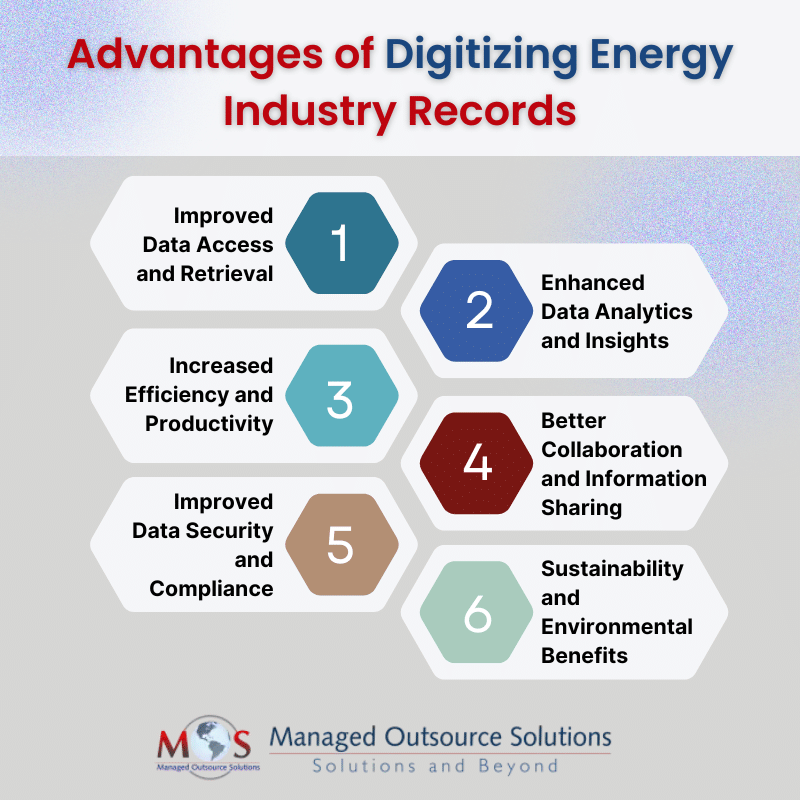Digitization is essential for industries to transform data into electronic format and facilitate more efficient data gathering and analysis. This is particularly crucial for the energy industry, as digitalization can help boost production, sustainability, and overall efficiency. By converting data into a digital format, energy companies can support the delivery of data-driven services to meet the evolving demands of modern consumers, ultimately driving increased revenue. One of the first steps towards achieving these goals is embracing document scanning solutions, which allow for the seamless conversion of physical documents into digital files.
The need for the adoption of new technologies in energy gained greater significance after the COVID-19 pandemic. Unlocking the magnitude of energy resources is required to improve people’s lives in a way that does not choke the environment, and this cannot be done without the power of digital to improve efficiency and manage complexity, notes a Mckinsey report. As they face more competition, more complexity, and less predictability, digitization matters for the survival of energy companies too. According to the report, successful application of digital in energy companies facilitated 2 to 10 percent improvements in production and yield and 10 to 30 percent improvements in cost.
Key Advantages of Digitizing Energy Industry Records
Digitalization enables the energy sector to leverage data-driven insights to optimize operations, reduce costs, and enhance decision-making. From improving asset performance to streamlining supply chain logistics, the benefits of embracing digital technologies are far-reaching. As the energy landscape continues to evolve, staying at the forefront of digitization will be crucial for organizations looking to maintain a competitive edge and meet the needs of their customers.
By embracing the digitization of their records, energy companies can streamline operations, improve data-driven decision-making, enhance collaboration, and ultimately, drive greater efficiency, sustainability, and profitability.
- Improved Data Access and Retrieval
Relying on paper documents can slow down process and significantly impact efficiency at all levels. Digitized records can be easily searched, accessed, and retrieved, enabling faster decision-making and increased productivity. As in any industry, scanning and digitizing paper documents eliminates the need for physical storage space and improves the organization and management of information.
- Enhanced Data Analytics and Insights
Digitized records can be easily integrated with data analytics tools, enabling energy companies to extract valuable insights and make more informed decisions. For example, analyzing electricity usage data can provide valuable insights. By collecting customer data from electricity bills and meters, companies can better understand consumer behaviors and usage patterns. This enables service providers to optimize operations, resource allocation, and marketing strategies. They can develop tailored pricing and package offerings to meet the unique needs of different customer segments, attracting more consumers and improving profitability.
Advanced analytics can also help develop predictive maintenance strategies. Performance tracking of various machines and systems can help predict when system or machine maintenance is needed. This allows energy companies to schedule repairs proactively, preventing unexpected breakdowns that could disrupt operations. Utilizing predictive maintenance insights can help them optimize asset performance and minimize downtime.
- Increased Efficiency and Productivity
In addition to enhanced data analysis, digitalization enables greater automation, reducing the need for manual intervention and simplifying critical procedures. Digitization automates repetitive tasks, such as data entry and document filing, freeing up employees to focus on more strategic tasks. Digital workflows and processes streamline operations, reducing the time and resources required to manage records and minimizing waste. Collectively, these digital transformations culminate in a more efficient and cost-effective energy system that better serves both providers and consumers.
- Better Collaboration and Information Sharing
When paper records are digitized, they can be easily shared among teams, departments, and stakeholders, enhancing remote work capabilities. Authorized users can access records stored in the cloud from anywhere, driving better collaboration and information exchange.
- Improved Data Security and Compliance
Digitized records can be backed up and protected from physical damage, theft, or loss, ensuring the long-term preservation of critical information. Moreover, with digitized records, companies can employ computer simulations to identify and eliminate potential safety threats in energy production and distribution operations. With robust access controls and audit trails, energy companies can meet regulatory requirements and maintain data privacy.
- Sustainability and Environmental Benefits
Sustainability is an urgent priority for the energy sector, and digitization offers a critical solution for reducing the environmental impact of energy production and usage. Scanning records reduces the need for physical storage space and paper consumption, contributing to a more sustainable and eco-friendly energy industry. The elimination of paper-based processes can lead to significant cost savings and reduced carbon footprint. It also enables the application of digital technologies that can help optimize energy consumption, minimize waste, and enhance the efficiency of renewable power sources like wind and solar. It also facilitates more accurate monitoring and reporting of environmental metrics, empowering energy companies to closely track and actively reduce their carbon footprint and work towards a greener, more eco-friendly future.
Strategic Approach to Document Digitization
When implementing a document scanning initiative, energy companies should adopt a comprehensive and strategic approach comprising the following steps:
- Conduct a thorough assessment of the existing physical records, evaluating factors such as volume, condition, and organizational structure.
- Develop a detailed project plan based on this information that defines the scanning workflow, data capture requirements, and quality control measures.
- Select the right scanning equipment and software to ensure efficient, high-quality conversion of documents into digital formats.
- Set up secure storage and access protocols for the digitized records, integrating them with existing IT infrastructure and implementing robust data governance policies.
Seeking professional assistance is a viable strategy for successful project completion, Partnering with an experienced document scanning company can ensure that bulk records are digitized methodically and efficiently, improving data access, streamlining operations, and enhancing productivity.
Transform your operations!
Develop a customized document scanning and imaging plan for your business!





